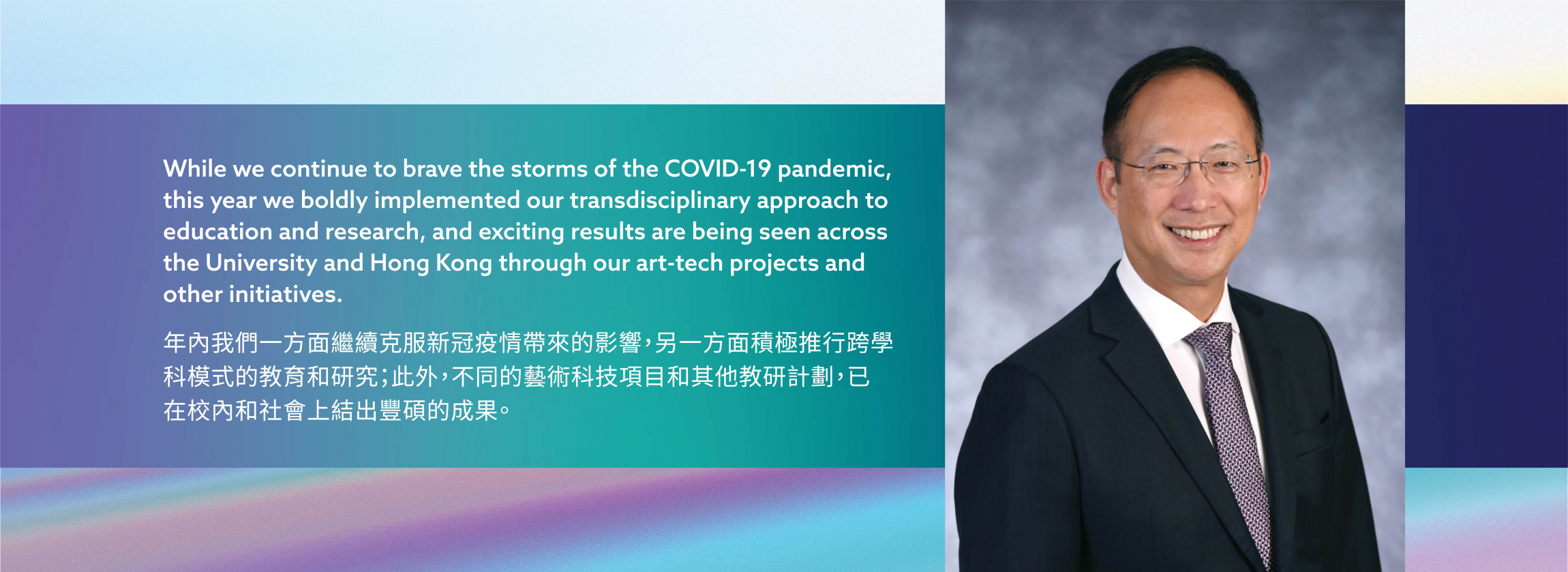President's Message


A new beginning
I'm delighted to have joined the HKBU community, and as I reflect on my first year at the University, I would like to thank colleagues, students and community members alike for the warm welcome, and for their commitment to teaching, learning and the University's ongoing development.
The past year has posed many challenges, but the events that took place in the year under review have also presented us with an opportunity to look at things afresh, and despite the obstacles that have littered the path ahead of us, we have moved forward decisively in our quest to advance education and research.
Transform, translate and transcend
The higher education sector is undergoing an exciting transformation that has been brought about by the pandemic, and the incredible advances in AI and technology that exist all around us. As we find ourselves at an exciting juncture between the approaches of the past and the rich promise of what's to come, we need to future-proof our institution and give our students the skills to survive and thrive in this new world.
At HKBU, our students are learning in an inspiring transdisciplinary environment that provides them with the knowledge and tools to flourish on their flexible, customisable learning pathways. Our six interdisciplinary research laboratories are also showing other institutions in the region the way forward, as our artists and scientists are enlightening each other with their unique perspectives, and they are collaborating on cutting-edge projects and innovations.
In particular, the development of art-tech is one of our key focuses, and our landmark five-year "Building Platform Technologies for Symbiotic Creativity in Hong Kong" project, which received HK$52.8 million in funding from the Research Grants Council (RGC), will change the cultural landscape in Hong Kong, and other places around the world, beyond all recognition. As HKBU is a centre of knowledge creation and development, it is also imperative that we make that knowledge and expertise available to society. Through collaboration with our valued alumni, partners and supporters, we will continue to translate our discoveries into impactful innovations for the benefit of mankind.
Although the pandemic has kept us physically apart, we managed to transcend the limitations on global travel, and we have exposed our students to a bigger world through our virtual exchange programmes and internationalisation initiatives. I am equally excited by the development opportunities offered to our graduates and students in the Greater Bay Area as well as other places around the globe, thanks to the support of employers and our alumni community.
Improving our talent pool and infrastructure
We have also seen great progress in terms of our ambitious development plans, both on campus and further afield. Through the Talent100 initiative, we have recruited talented academics to the University from around the world. In addition, we have introduced the Talent100 PhD Scholarship Scheme to recruit PhD students, and it will enhance the University's research capacity and elevate the standard of doctoral training, particularly interdisciplinary research training. Students admitted under the Scheme are hosted by the Institute of Interdisciplinary Studies, and they are involved in the interdisciplinary research projects affiliated with the six interdisciplinary research laboratories.
On infrastructure, the Jockey Club Campus of Creativity (JCC) and the Chinese Medicine Hospital (CMH) are two important capital projects in the pipeline. Both will transform our research and educational offerings, and they will also lead to seismic changes in the community in terms of the well-being of Hongkongers and the creative output of the cultural industries.
The JCC will stand as an icon of new living-learning communities as well as what can be achieved with a creative education. Housed within the JCC, the Jockey Club Creative Hub will be equipped with state-of-the-art facilities for creative disciplines, and it will certainly take our art-tech capabilities to a new level. On the other hand, with the University being the pioneer of Chinese medicine (CM) education, research and clinical services, the CMH will help to promote the development of specialist CM services in Hong Kong and substantially raise the standard of CM healthcare services in Hong Kong. It will also lead to huge development opportunities for the industry.
HKBU community has faced strong winds, I am certain that we can move forward together and look optimistically to the year ahead as we continue to advance our personalised education and art-tech research, and develop synergistic transdisciplinary solutions to the grand global challenges in our six interdisciplinary research laboratories.


Alex Wai
President and Vice-Chancellor
Chair Professor of Photonics
December 2021